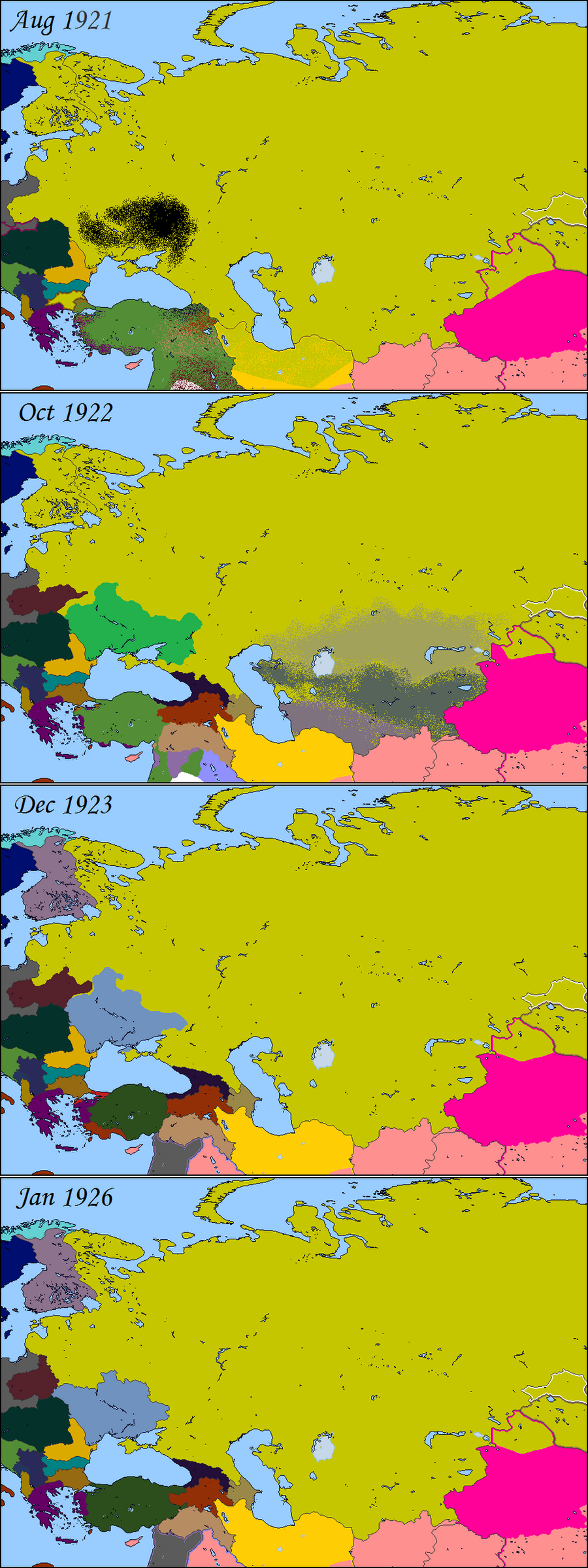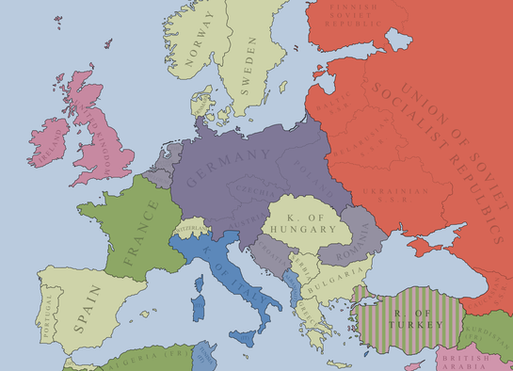HOME | DD
 HistoryRedone — TL-1857, part 3c, Russian Revolution
by-nc-nd
HistoryRedone — TL-1857, part 3c, Russian Revolution
by-nc-nd

#alternatehistory #armenia #georgia #germany #ottoman #poland #revolution #romanov #russia #tsar #turks #althistory #turkic #german_empire #alternatehistorymap #germanempire #tl1857 #anarchist #communism #communist #kazakhstan #soviet #ukraine
Published: 2019-07-16 12:37:33 +0000 UTC; Views: 5887; Favourites: 19; Downloads: 4
Redirect to original
Description
A follow-up to my scenario The North Secedes , as requested by my watchers
!!DISCLAIMER!!
This scenario covers a time period of almost a century after the original PoD and covers the alternative course of World War One.
Therefor, the accuracy and realism of this scenario is significantly lower than in part one. Still... this is a lot of fun
So enjoy.
PoD: 1857
With the 1918 Treaty of Cologne ending the Great War Russia was left with one new territory under its influence, and war reparations of Bulgaria to pay part of the debt the war had caused them.
Three points now stood at the top of Emperor Nicholas II's to-do list:
- Find a suitable Ban to rule over Rumelia,
- Restore the damage done to the Russian nation during the Third Balkan War, as it was called there,
- Suppress the growing unrest and eliminate the power of the revolutionaries in the Empire.
Over the course of 1918 and 1919, Most of Nicholas II's actions were purely reactionary. The nation was unstable, and though many praised the way he had acted in 1914 and saw how close the Empire had gotten to an all-out war with Germany, more still saw him as an incompetent ruler. Russia had been suffering socialist unrest for almost 50 years, with Emperor Nicholas's grandfather even being assassinated by a revolutionary in 1881. The unrest had decreased slightly during the war, but as soon as peace was signed, it grew once more. The Emperor's only reply was an increase in cracking down on any dissidents.
In February 1920, the first point on the to-do list was solved: after lobbying for months, the Central Regency Council of Rumelia agreed on a candidate to become the first Ban of Rumelia. Nikolai Alexandrovich Kulikovsky, second husband of Grand Duchess Olga Alexandrovna of Russia, the sister of Tsar Nicholas II and as such the brother-in-law of Emperor Nicholas II, was selected. And the then 38-year-old military man was crowned in the Rumelian capital of Plovdiv. This was a success for Nicholas II, though it would be the last.
1920-21 saw a major drought in Russia, leading to food shortages. Dissatisfaction, disloyalty, and even revolutionary thoughts had been brewing for a long time in Russia, and the Tsar's reactionary rule lacked the efficiency needed to prevent the growth of this. By March 1921, famine had struck, only worsened by the small outbreaks of revolution on the western frontiers of the empire. In the Caucasus, the Georgians, Azerbaijanis, and the Armenians revolted by stopping the transports going out of the region and killing anyone who opposed them, trying to stop the growing famine as best as they could, and carving out their own states along globally ethnic borders.
In the Ukraine, anarchist groups tried to establish a "Free Territory", where "free soviets" and libertarian communes operated under the protection of Nestor Makhno's Black Army. They clashed with the more democratic, but still revolutionary Ukrainian White Army, who sought to establish a system of popular representation to rule Ukraine under the Tsar; with the small but ferocious guerilla fighters of the Communist Red Army; and with the strongly diminished Imperial Army. Where most people serving in the Black, White, or Red armies were Ukrainian both in their troops as well as in their deployment, the Imperial Army was severely hampered by the other revolutions going on in the Empire, and they were spread thin. Too thin.
In 1922, Makhno had been killed, and the Free Territory had fallen to the Ukrainian People's Republic, which only lasted until November that same year, when an Imperial army officer of Cossack descent named Pavlo Skoropadskyi, who had himself declared Hetman of Ukraine. Even though the Russian Empire did not recognise him, there was little they could do, as their forced had been drawn away to the Caucasus mountains and the Central Russian steppes.
A lot of the Imperial Army soldiers that fought in Ukraine, were previously
stationed in Poland, then officially the Privislinsky krai. It used to be the Kingdom of Poland under the Russian crown, but throughout the 1880's had been increasingly stripped of autonomy and incorporated into Imperial Russia. With the Russian Imperial presence decreasing, the Poles rallied behind the only Romanov they could feel for: Grand Duke Konstantin Konstantinovich, son of the former Namiestnik, Viceroy, of the Kingdom of Poland, Grand Duke Konstantin Nikolayevich, who had fought to emancipate the serfs and restore some aspects of Polish culture to them. Konstantin Konstantinovich was an artistic slavophile and devoted to duty, and when a delegation of Polish nobles and high-ranking officers beseeched him to take up the crown, the Grand Duke relented. In 1922, King Konstantin I was crowned in Warsaw, though he delegated much of the day-to-day ruling to his nobles and officers, as he recognised his inexperience and unfamiliarity with his new nation, and has seen first-hand what not delegating by an insufficient ruler could do to a nation.
Konstantin I's acceptance of the throne directly lead to his cousin Tsar Nicholas declaring war onto the "Polish revolutionaries". In August 1922, the Russo-Polish War started in earnest, as Russian Imperial soldiers attacked Suwalki and Lomza, taking both cities within days, while the newly reformed Polish Army gathered around Warsaw and Siedlce, launching a counter-attack into Russian lands only one month later.
By mid-1923, Russia was in complete disarray. It was fighting official wars with Poland, Ukraine, Georgia, and Armenia, open conflicts with Azerbaijan, the Kazakhs, Uzbeks, and Turkmens, and in May 1923 Finland seceded as well, forming a parliamentary government under the regency of Carl Gustaf Mannerheim. The position of the Tsar became unmanageable, and in a last attempt to reforge himself into the image of a strong monarch, he ordered his cousin, Grand Duke Kirill Vladimirovich, the Commander of the Naval Guards, to go south and "bring peace to the Caucasus", whilst he himself made for the Ukraine.
Grand Duke Kirill succeeded in completing the Tsar's command, though not as his cousin had intended: upon arriving at the western Caucasian front, Kirill demanded to meet with the Georgian Provisional High Command. The initial talks resulted in Kirill being received by both the Provisional High Command and the Provisional Government, as well as the equivalent bodies of Azerbaijan and Armenia. In November 1923, a peace was signed in Gori, between the Russian Empire and the new states of Georgia, Armenia, and Azerbaijan. This peaceful outcome gave the Empire a much-needed break, and allowed some semblance of power to return to the Russian side of the wars.
After this, Kirill marched east, where the news of his quick successes in the Caucasus had quickly spread among the disunited tribes of the steppes. In September 1924, Grand Duke Kirill returned to the West, having pacified the Eastern provinces of the Empire, and being cheered on by crowds wherever he went.
The Tsar by this time had been bogged down in Azov, where his troops had been unable to gain much if anything over the last fifteen months, except for mounting casualties and constantly diminishing provisions. The Imperial Army not only had to contend with the Ukrainians to the North and West, but also with the Reds, Whites, and Blacks to their East, and growing distrust and rebellion from within the ranks of the army as well.
When Grand Duke Kirill entered the camp under salute shots and the cheers of thousands, Nicholas flew into a fit of rage and tried to have his cousin arrested. His officers, however, seeing the extreme danger any hostility towards the victorious Kirill would result in, they instead welcomed him with full honours, befitting a victorious Imperial Commander and Grand Duke. As Kirill was received, Nicholas II retreated back into his chambers, contemplating what to do with this final writing on the wall. After an hour, he came out to greet his cousin, and the two began to formulate battle plans to end the stalemate and draining of vital Imperial resources. However, when Kirill suggested signing a peace with the Hetman of Ukraine and their cousin Konstantin of Poland, and thus recognising them as the heads of sovereign states, Nicholas II flew into an even greater rage, striking Kirill and accusing him of giving away Russian territory as if he himself were the Tsar. He had his bodyguards arrest Kirill and drag him outside. His Imperial counselors tried to calm the enraged Tsar, but the most outspoken of them got arrested as well.
When the rumour spread that Kirill was arrested and, as the soldiers quickly whispered among each other, was to be executed for treason, the riot that had been brewing for a long time finally broke out. In the confusion, 34 soldiers died, 267 got injured, including even the Tsar, who was rushed out of the camp, but not before suffering a leg wound from a stray bullet. Kirill was declared the new Emperor of All Russia by the soldiers, and though he initially renounced the title, he eventually accepted, in an attempt to restore peace among the troops.
The first thing Tsar Kirill did was send telegrams to his cousin Konstantin of Poland. They discussed and started a ceasefire on the 1st of October, and signed a peace in December. After settling the Polish border, Tsar Kirill focused his efforts on pushing back Hetman Pavlo Skoropadskyi of Ukraine, attacking him from three sides, getting within 50 miles of Kiev and forcing the Hetman to sign an armastice, favourable for Russia. The Treaty of Kiev ended the war with Ukraine, giving the new state much of the land it had taken possession of, but making it pay yearly war reparations in gold and grain.
By 1926, things had calmed down significantly in Russia: Tsar Kirill had consolidated his power, the former Tsar Nicholas II and his family had taken refuge in Switzerland, the effects of the war were waning, and the relationships with the seceded powers were slowly recovering, though some more than others. Internationally, Tsar Kirill lacked the blood ties to the other royal houses that Nicholas II had, but the greater diplomatic skill of the new Tsar compensated for some of that disadvantage.
But despite this all, there was a more pressing matter, that would soon prove the new Tsar's skills, as there were rumblings in the west...



























